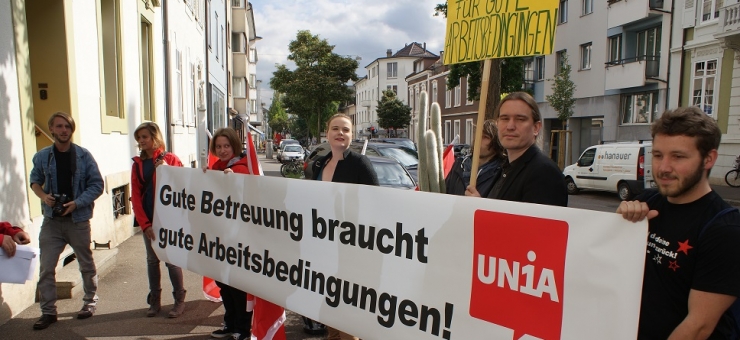News
New collective agreement secures good working conditions for private sector employees providing care to the elderly in Switzerland

A new collective agreement, successfully negotiated by Swiss UNICARE affiliate UNIA, regulates working conditions in the rapidly expanding private sector of in-home care for the elderly. It establishes minimum wages, as well as working and rest times, and ensures the provision of top quality care.
The trade union UNIA and the Living At Home Association have signed a new collective agreement covering private care for the elderly in the German-speaking part of Switzerland. The agreement regulates working conditions in a rapidly expanding sector and establishes minimum wages, fixes working and rest hours, and ensures the provision of top quality care. The social partners have asked the State Secretariat for Economic Affairs (SECO) to declare the collective agreement to be generally binding for the whole of German-speaking Switzerland.
The agreement that was negotiated between Unia and the Living at Home Association sends a strong signal for a sector which has grown enormously over the last few years and where a few individual companies regularly make for negative headlines. The agreement covers private for-profit enterprises and agencies that provide non-medical care for the elderly in German-speaking Switzerland.
The key aspects of the new collective agreement are:
- minimum wage rates (the lowest rate to be gradually increased to 22 Swiss francs by 2018) plus a 13th month salary)
- professional experience to be taken into account for the calculation pay, as well as any initial and further training
- working and rest times, including compensation for travel and on-call service
- payment of per diem sickness indemnity
- promotion of continual vocational training
- special protection against dismissal for trade union representatives
- establishment of a joint committee to supervise and verify the implementation of the collective agreement.
The At Home Association and UNIA both see the new collective agreement as an important milestone that will benefit employees, care receivers and the entire sector. “Thanks to this collective agreement, we have brought clarity to the market and created transparent and fair conditions for the elderly and for the caregivers”, explains Paul Fritz, lead negotiator on the At Home side, during a press conference in Bern. “With fair wages and well trained staff we will promote a positive image and trust”, according to Margaretha Stettler, President of the Association. Vania Alleva, Co-President of Unia, said that the agreement ensured that all the parties involved were treated on the same terms and that it would be a tool “to combat the black sheep who grossly exploit their employees”. She went on to say, that “when people are employed in a private home, they are basically off the public’s radar and therefore they need to be protected more than others”.
The contractual partners will ask SECO to declare the collective agreement to be generally binding for the whole of German-speaking Switzerland. The aim is to have it come into effect at the latest by 1 January 2015. Currently, there are 6000 employees who will benefit from it.

